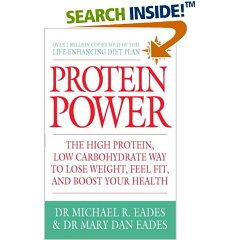
Thanks to some readers of The Heart Scan Blog, I've become acquainted with Dr. Michael Eades' wonderful blog, Health and Nutrition by Dr. Michael R. Eades, MD.
Dr. Eades is co-author (with his wife, Mary Dan Eades, MD) of Protein Power
In one of his conversations, I stumbled on this exchange between Dr. Eades and one of his readers:
Reader: Regarding EBT scans, I looked up the topic on Google and read an informative 5-page article: EBT (Ultrafast CT) Scans - Godsend, or Scam? Dr. Fogoros says that false positives (where the EBT shows the presence of calcium, but the patient has little coronary artery blockage) occur about 50 percent of the time. The next step, if the EBT is positive, is to do a heart catherterization to find out whether there actually is coronary artery blockage. So the odds are that I’d have to worry!
Dr. Michael Eades: The info you got from Google is one of the reasons one shouldn’t get medical information online. As far as I’m concerned the EBT is the BEST way to determine the presence of plaque. If you have a positive calcium score, you have plaque, and there’s an end on’t (as Samuel Johnson would say). Now you may have a low calcium score for your age or you may have a calcium score that doesn’t change, which means you have stable plaque, but if you have a positive calcium score, you have some amount of plaque in your coronary arteries.
And whoever says that the next step to take if you receive a positive calcium score is a coronary artery cath is a real moron. That’s probably the last thing you would want to do if you are asymptomatic. All the cath procedure does is shows whether or not you have a blockage - you can have huge amounts of plaque (which are a disaster waiting to happen) and have a normal cardiac cath.
If you want to get a little more information on the validity of EBT than what you find on Google, take a look at Dr. Davis’ blog or get a copy of his book: Track Your Plaque. I’m not crazy about all of Dr. Davis’ dietary recommendations because he comes to diet from a different perspective than I, but the EBT info in his book is terrific.
Cheers–
Dr. Eades "gets" it. He understands that quantification of coronary plaque is a tool for prevention , not something to be subverted into the service of procedures for the financial benefit of my colleagues.
And I think that he is absolutely correct on the diet discussed in Track Your Plaque--it's due for a revision. I wrote the book in 2003, while we were still locked into the low-fat mindset. Much has changed.
Since then, our enormous experience in metabolic manipulation and lipoprotein analysis has shown that there is a far better way to correct the causes of coronary plaque and seizing hold of heart scan scores. In particular, the explosion of small LDL has prompted major changes in the diet, specifically removal of wheat and cornstarch, the foods that trigger small LDL particles.
(I am still in the midst of negotiations for release of a bigger and better Track Your Plaque II. In the meantime, Track Your Plaque Members can refer to the New Track Your Plaque Diet, Parts I, II, and III.)